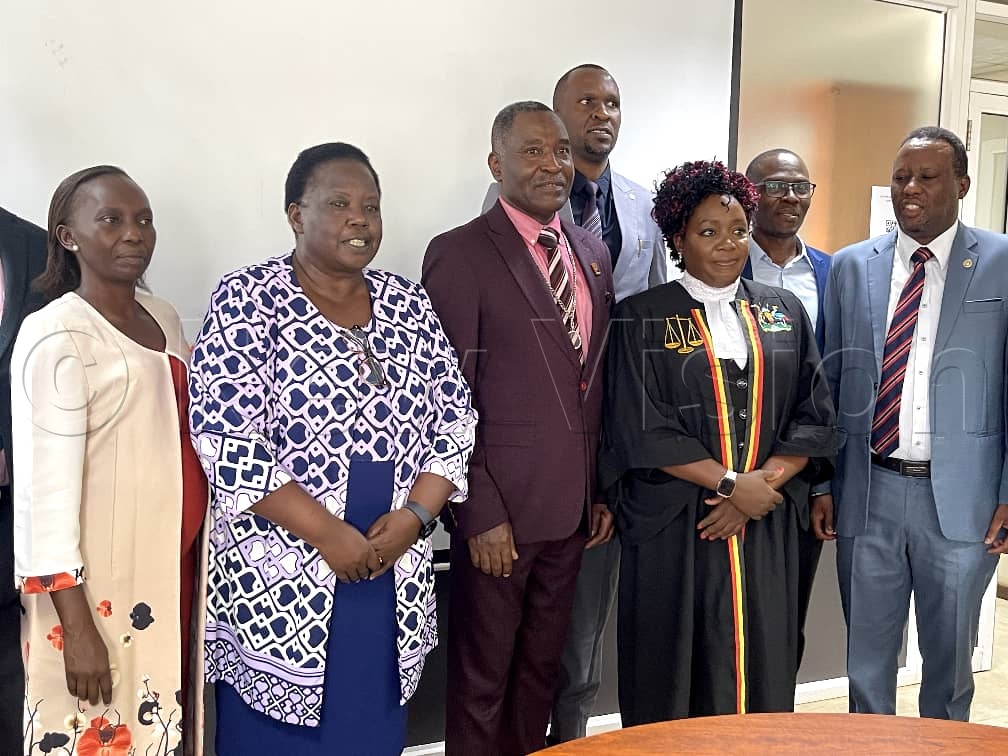Uganda’s first planners board to curb unplanned land development
The boards, established under the Physical Planners Registration Act, Cap 302, are mandated to regulate, register and enforce standards for planners and planning assistants, aiming to curb unplanned developments and promote functional, well-designed, built environments.
Derrick Alfred Muhwezi Banyweine, Chairperson of the established PPRB swears in as Harriet Nalukwago Ssali, Registrar Special Duties looks on. (Photo by Richard Ategeka)
______________
The lands and urban development ministry has sworn in its first statutory Physical Planners’ Registration Board (PPRB) and the 14th Architects’ Registration Board (ARB). The development marks a major step toward organised and sustainable land development across the country.
The boards, established under the Physical Planners Registration Act, Cap 302, are mandated to regulate, register and enforce standards for planners and planning assistants, aiming to curb unplanned developments and promote functional, well-designed, built environments.
PPRB chairperson Derrick Alfred Muhwezi Banyweine says that since independence, Uganda has never had a statutory body to regulate physical planning.
“This is the first board of its kind in the country,” he says, stressing the urgent need to register qualified planners and raise public awareness about the profession.
Banyweine was giving his remarks during the ceremony at Crested Towers in Kampala city on November 18, 2025.
Group photo. (Credit: Richard Ategeka)
He warned that the lack of regulation has allowed unqualified individuals to pose as planners, contributing to disorderly land subdivisions, non-compliant developments, and poorly organised neighbourhoods.
“Many people are still unaware that physical planners exist. Our board will ensure only qualified individuals handle land development and raise public awareness about lawful and sustainable planning.”
Accordingly, there are still a few experts and some districts operate with only one or no planner, leaving communities unaware of the profession’s role and importance.
The board’s establishment is seen as critical to restoring planning functions weakened by past restructuring.
Planning is essential
Landa ministry permanent secretary Dorcas Okalany emphasised that planning is essential not only for settlements but also for food security, land use and sustainable growth.
“For decades, Uganda has lacked a professional body to regulate physical planners, leading to fragmented development, low compliance, and weak enforcement,” Okalany said.
She confirmed that the Government is also amending the Physical Planning Act (Cap 122) to strengthen institutional co-ordination.
Harriet Nalukwago Ssali, registrar special duties, who administered the oaths, highlighted the importance of integrity and public trust among office bearers.
“An oath creates a covenant between the office holder and the people they serve. Board members are now bound to defend the Constitution, follow the law, and uphold public trust,” she said.
Collaboration
Miriam Lawino, Chairperson of the Architects’ Registration Board, stressed the need for collaboration between architects, planners, surveyors, and engineers.
“Our board will promote compliance, expand regional presence, and ensure architects contribute to building committees nationwide.”
Without proper input, spaces can become unsafe, cramped, or poorly organised,” she said.
Lawino added that Uganda currently has only 319 registered architects, thus the need for increased recruitment and regional coverage to improve monitoring and enforcement outside the capital and major towns.
The ministry is expanding national and regional planning initiatives under programmes such as USMID and the upcoming WICHMID, targeting new cities, municipalities and rural areas.
Uganda already has frameworks like the Albertine Graben Plan and the Northern Uganda Economic Corridor Development Plan, as well as district and urban physical development plans.
Okalany urged the boards to enhance compliance, visibility, and coordination across all levels of planning.
“We want a Uganda where future generations live comfortably, with organised land use, sustainable development, and secure tenure,” she said.